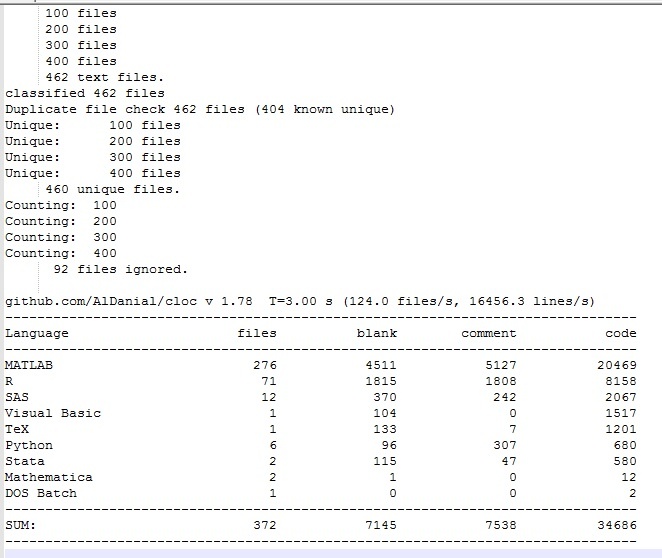Difference between revisions of "Cloc"
Jump to navigation
Jump to search
Prwheatley (talk | contribs) |
|||
| (One intermediate revision by one other user not shown) | |||
| Line 1: | Line 1: | ||
| − | + | {{Infobox tool | |
| − | + | |purpose=Cloc (Count Lines of Code) serves not only to count the lines of Code,but also guesses the programming language, thus can be used to identify files. It is a command line tool which is easy to use. | |
| − | {{ | ||
| − | |purpose= Cloc (Count Lines of Code) serves not only to count the lines of Code,but also guesses the programming language, thus can be used to identify files. It is a command line tool which is easy to use. | ||
| − | |||
|homepage=[https://github.com/AlDanial/cloc CLOC in GitHub] | |homepage=[https://github.com/AlDanial/cloc CLOC in GitHub] | ||
| − | |license= GNU General Public License v2.0 | + | |license=GNU General Public License v2.0 |
| − | | | + | |function=File Format Identification |
}} | }} | ||
| − | + | {{Infobox tool details}} | |
| − | |||
| − | |||
| − | |||
| − | |||
| − | |||
| − | |||
| − | |||
| − | |||
| − | |||
| − | |||
| − | |||
== Description == | == Description == | ||
<!-- Describe the what the tool does, focusing on it's digital preservation value. Keep it factual. --> | <!-- Describe the what the tool does, focusing on it's digital preservation value. Keep it factual. --> | ||
| Line 44: | Line 30: | ||
<!-- Provide *evidence* of development activity of the tool. For example, RSS feeds for code issues or commits. --> | <!-- Provide *evidence* of development activity of the tool. For example, RSS feeds for code issues or commits. --> | ||
<!-- Add the OpenHub.com ID for the tool, if known. --> | <!-- Add the OpenHub.com ID for the tool, if known. --> | ||
| − | + | ||
| − | |||
| − | |||
| − | |||
| − | |||
| − | |||
The tool is now released at GitHub. [https://github.com/AlDanial/cloc/releases CLOC Page on GitHub] | The tool is now released at GitHub. [https://github.com/AlDanial/cloc/releases CLOC Page on GitHub] | ||
There are new releases roughly twice a year. | There are new releases roughly twice a year. | ||
Latest revision as of 16:40, 21 April 2021
Description
Start the command line from the folder which contains the CLOC exe file.
Type:
cloc-1.78.exe D:/Folder/fileToAnalyse
The findings are shown in the black window. Alternatively, you can have an output file
cloc-1.78.exe D:/Folder/fileToAnalayse > outputfile.txt
You can also analyse all files in certain folder, the syntax is like this:
cloc-1.78.exe D:/AnalyseWholeFolder > outputForAllFilesInFolder.txt
User Experiences
Development Activity
The tool is now released at GitHub. CLOC Page on GitHub There are new releases roughly twice a year.
